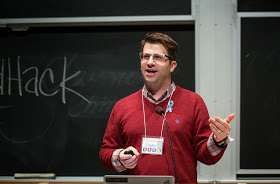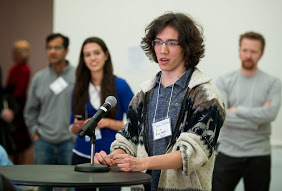Healthcare entrepreneurs have found a home to hack in at MIT H@cking Medicine. The unique competition and collaboration event which took place on March 14-16th brought together patients, engineers, designers and entrepreneuers at MIT’s Medial Lab.
Over 450 people attended the event which was sponsored by the Kaufman Foundation and The Global Genes Project (among others.) The room was alight with excitement and creativity as participants bantered back and forth on new ideas and possibilities that could improve patient’s lives. The collaboration bounced between payors and clinicians, hospitals and patients and inventors and engineers.
In the Rare Diseases track, cutting-edge software, Recognyz, featured facial recognition for syndrome diagnosis and was released to a group of MIT students from all disciplines.
The creator behind the software was author and geneticist Sharon Moalem, MD, PhD. who served as the rare disease unit’s team mentor.
“The H@ckathon was a brilliant success, the team improved the capture of images and were able to diagnose three conditions,” said Moalem. “Marfan’s, Kabuki and Waardenburg syndromes.”
The hackathon was the final push that would follow more than seven years of research and investments by Dr. Moalem to develop an inexpensive facial recognition tool for genetic and congenital disorders by leveraging technology developed for the security industry. This technology may provide a way to help physicians screen for rare genetic conditions that would otherwise be missed.

Working in concert with the Dr. Moalem, students and physicians worked on the algorithms to iterate specific decision trees embedded within the software and provide a more specific and rapid diagnoses.
Another team added the vantage point of using machine learning algorithms to assess eye movements- provided a possible tool for neuromuscular disease diagnosis. The energy in the room was electric and as one of speaker stated, if we could “bring these enthusiastic minds” to work on the problems in healthcare today, we would reach better solutions, quicker. The key tent of this event was to achieve measurable outcomes in the form of small scale and large scale pilots that could be rolled out within a few weeks following the event and with such a goal in mind and approximately 40 hours with one’s team -the objective to come up with possible solutions to validated needs was clear.
Samples of the winning teams included a glucose monitor that is non-invasive, using Google Glass in clinical encounters to quickly retrieve data, crowd-source funding to fund clinical research pilots and accelerate the speed of research. In an era when healthcare is fraught with competition – it is wonderful to see such cooperative and serious play in action.

Next month, MIT’s Hacking Medicine takes its act to NYC for an event with major medical payors, medical schools and WebMD!

Stay Connected
Sign up for updates straight to your inbox.
